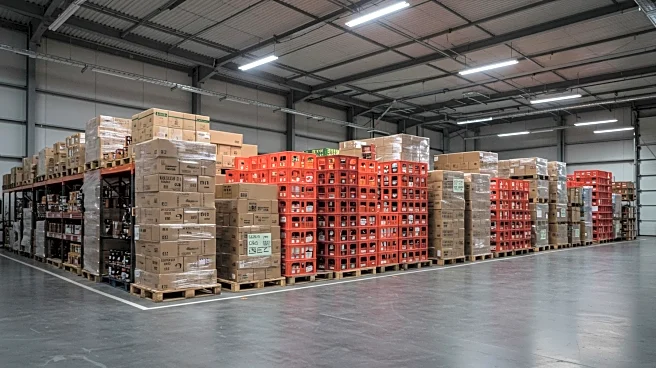What's Happening?
Marks & Spencer (M&S) has unveiled a record £340 million investment aimed at expanding its food supply chain. This investment will fund the development of a new automated National Distribution Centre (NDC) in Northamptonshire, set to open in 2029. The facility, located at Daventry International Rail Freight Terminal, will span 1.3 million square feet and incorporate advanced automation technologies to enhance operational efficiency and product availability. This move is part of M&S's broader strategy to double the size of its M&S Food business and modernize its supply chain. The investment supports the company's store rotation and renewal program, which aims to create 420 larger food stores and 180 full-line stores by 2027/28. During the construction phase, the new NDC will create over 2,000 jobs, with around 1,000 permanent positions once operational.
Why It's Important?
The investment marks a significant step in M&S's efforts to transform its food business into a destination for weekly shopping. By modernizing its supply chain, M&S aims to boost capacity for future growth, reduce long-term service costs, and improve product availability. This strategic move is expected to strengthen M&S's competitive position in the UK retail market, particularly in the food sector. The creation of thousands of jobs during the construction and operational phases will also have a positive impact on local employment and the economy. Additionally, the use of advanced automation technologies will future-proof M&S's logistics operations, ensuring efficiency and reliability in product distribution.
What's Next?
As M&S progresses with its investment, stakeholders can anticipate further developments in its store rotation and renewal program. The company is likely to continue focusing on enhancing its food business and supply chain capabilities. The successful implementation of the new NDC and its automation technologies will be crucial in achieving M&S's growth objectives. Industry observers will be watching how M&S's strategy influences its market share and customer base in the coming years.
Beyond the Headlines
The investment in automation and supply chain modernization reflects broader trends in the retail industry, where companies are increasingly leveraging technology to improve efficiency and customer experience. M&S's initiative may set a precedent for other retailers to follow suit, potentially leading to widespread adoption of similar technologies across the sector. The ethical implications of automation, particularly concerning job displacement, will be an important consideration as M&S and other companies navigate these changes.











